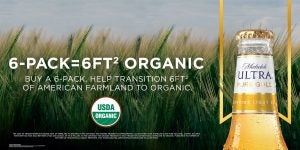Super Bowl commercials have become a collateral attraction to the big game for years. Companies spend exorbitant amounts of money hoping to leave a lasting impression on viewers. And it’s an excellent opportunity with the Super Bowl having an average viewership of 98.2 million people.
Michelob Ultra Pure Gold, an organic beer, is taking another stab commercial glory with its 6 For 6-Pack campaign. Michelob promises that for every six pack of its organic beer sold, it will help transition six square feet of farmland into organic production. The commercial is part of Anheuser-Busch’s larger “Better World” campaign that hopes to meet certain sustainability goals by 2025.
Of course, those familiar with Super Bowl commercials will likely remember Anheuser-Busch’s epic failures last year. Bud Light’s no-corn-syrup advertisements sent farmers on social media into a full-blown meltdown. It was a dumb move that poured over into the courtroom when MillerCoors sued over the commercial’s misleading nature (MillerCoors won the lawsuit in federal court). Anheuser-Busch’s later efforts to fix the rift were generally unsuccessful.
But Bud Light wasn’t alone last year. Michelob, which is also owned by Anheuser-Busch, introduced the Ultra Pure Gold organic beer with all the traditional aspects of beer commercials: celebrities and sex. Zoe Kravitz enticingly told viewers that this was “beer in its organic form.” And viewers were supposed to understand that, somehow, organic beer was better-for-you beer.
Perhaps I’m too cynical, but Michelob’s 6 For 6-Pack campaign seems like a misguided way to play nice with farmers. But it’s definitely not impressive.
This is the absolute epitome of virtue signalling. People can go to the store, pick up a pricey 6-pack of organic beer, and enjoy knowing it that it’s helping some general sustainability goal. Woohoo!
But this is literally the most pathetic attempt to “help” anyone. Let’s do some simple math. There are 43,560 square feet in an acre. Michelob is willing to support the transition of 6 square feet for every 6-pack sold. That means they have to sell 7,260 packs of beer to pay for one acre to transition to organic production.
What does that mean for actual farmers? Not much. The average U.S. farm is 234 acres. And that’s fairly small; my family farms about 2,000 acres — and that’s a mid-size farm in our area and crop type. Michelob would have to sell 1,698,840 packs of beer to help an “average” size farmer transition to organic production. (I won’t do the math for my family’s operation because there’s no reason to belabor the point.)
Who do you think is getting the better deal here: American farmers or Michelob?

And that doesn’t even get to a more important question: Why does Michelob think farmers want to transition to organic production?
This is likely about Michelob wanting to increase supply of organic grains so it can source cheaper ingredients for its beer. Only about 1 percent of U.S. farmland is currently certified as organic. That’s not because the process of transitioning is too burdensome, expensive, and difficult — it’s because most farmers choose not to switch over. So the supply is low. And as other companies have realized, that means organic grains are more expensive and must be shipped in from overseas. It becomes cost-prohibitive to continue producing these products on a massive scale. So Anheuser-Busch is only looking out for Anheuser-Busch.
It’s also not about sustainability. Because no matter what AB’s pretty report says, organic farming is not more environmentally friendly. Organic production generally yields significantly less than conventional farming, even while needing the same or more inputs. Organic farmers still use pesticides. And organic certification bans the use of genetically modified crops, which have shown to increase yields and decrease pesticide use. No matter which way you spin it, the world needs less organic farming to become more sustainable.
Unfortunately, Michelob didn’t put all those details in their Super Bowl commercial. They don’t mention it on their website. And they won’t tell the holier-than-thou customers paying extra for this beer. But I guess when you’re paying millions of dollars for a 30-second spot, facts don’t matter.
Amanda Zaluckyj blogs under the name The Farmer’s Daughter USA. Her goal is to promote farmers and tackle the misinformation swirling around the U.S. food industry.



